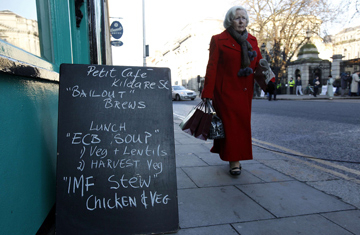
A pedestrian walks past a sign outside a cafe displaying a menu relating to the current economic climate, in Dublin November 23, 2010
A cold sleet falls upon Donegal, in the northwest of Ireland, as people prepare for a byelection that many see as a predictor for how the rest of the nation will vote in a general poll early next year. In Bruckless, near the port town of Killybegs, shopkeeper Barry Gallagher describes the mood among his customers. "People are very, very angry with the government," he says. "This vote will indicate to the rest of the country how much people are against the present government, because I think they're going to take a major hit in this byelection."
The Donegal South West constituency was once a stronghold for Fianna Fail, but recently support for the ruling party has collapsed. Thursday's vote, which is being held after the High Court ruled that a seat vacated by Fianna Fail's Pat Gallagher 18 months ago must be filled, will likely go to Sinn Fein candidate Pearse Doherty. That would reduce the government's majority in the Irish parliament to just two ahead of a Dec. 7 budget that is sure to further deepen the pain of a country that on Wednesday heard details of a €15 billion ($20 billion) in austerity measures to be met over the next four years. With the government clinging on by its finger-tips and the public looking for someone to blame, the only thing the Irish can know for sure over the next few months is that they can't know anything for sure.
Ireland's resolve has been battered by the events of the past few weeks. Only eleven days ago, as rumors of a rescue package for Ireland were swirling, Finance Minister Brian Lenihan was insisting there would be no bailout. But by Nov. 18, members of the European Union and the International Monetary Fund (IMF) had arrived in Dublin, and three days later, Lenihan announced that the government would be applying for financial help to try and safeguard the euro zone's stability.
Then came Monday's shock announcement by the Green Party that it would leave the coalition government after the Dec. 7 budget is passed, saying the country needs "political certainty" following a week in which the Irish had felt misled and betrayed. Since the Greens' revelation, Fianna Fail has been facing intensified calls to hold a general election and was finally forced to concede — a vote will take place early next year, probably in February. With an approval rating of only 17%, the party is widely expected to be all but annihilated.
And the newly unveiled austerity measures won't help. On Wednesday, the government laid out details of a harsh four-year recovery plan which aims to make €15 billion ($20 billion) of savings by 2014, with €10 billion ($13 billion) in spending cuts and €5 billion ($7 billion) in tax increases. But despite all the bad news and calls from opposition parties and members of the public for the government to resign, it is unlikely that Fianna Fail will fall before the general election, says political commentator Noel Whelan. "The budget is only 10 days away," he says. "The only prospect of an election now is if the government doesn't have the numbers [in parliament to pass] the budget and I think they will."
While some have accused the government of clinging to power, Fianna Fail insists that it is imperative for the country that the upcoming budget pass and that holding off on the election until early next year is the best way to ensure that happens. That's certainly the outcome the E.U. and IMF would like to see. The European commissioner for economic and monetary affairs Olli Rehn has already welcomed Ireland's recovery plan as a "sound basis for the negotiations on the fiscal and structural reforms" currently being hashed out between the Irish government, the European Central Bank, the European Commission and the IMF.
At the launch of the recovery plan on Wednesday, Finance Minister Lenihan said it is "enormously important from a political point of view [and] has to be the basis of any sensible proposals in the next general election. Anything else that's put forward is nonsense." The hint will not be lost on Fine Gael and Labour, the country's two largest opposition parties, which are expected to form a coalition following next year's general election.
But there's still uncertainty around whether the potential government partners can agree on key policy issues, and given the current crisis, there is plenty to disagree on. For example, Labour is traditionally close to the unions and will likely baulk at some of the measures contained in the austerity plan, especially the move to cut public sector staff levels by almost 25,000. Meanwhile, Fine Gael have called for almost 30,000 public job cuts in recent weeks.
For now, the government is trying to get the public's support for a future of financial hardship that it considers necessary and inescapable. "We have to try and pull together and make sure we get through this particular period, and I think we can and we will," said Prime Minister Brian Cowen on Wednesday. "We're smart, resilient and we're a proud people."
But this sense of hope is hard to come by on the streets of Donegal, where people will go to the polls on Thursday feeling despondent, angry and overwhelmed. "We'll never get out of this debt — my children, my grandchildren, they'll never get out of this debt," says taxi driver Paul McNern. "My children will have options elsewhere. I mightn't even stay in this country myself." Ireland will no doubt go through more twists and turns on the road to recovery — the question is whether the Irish are willing to stick with the government leading them down that road.
